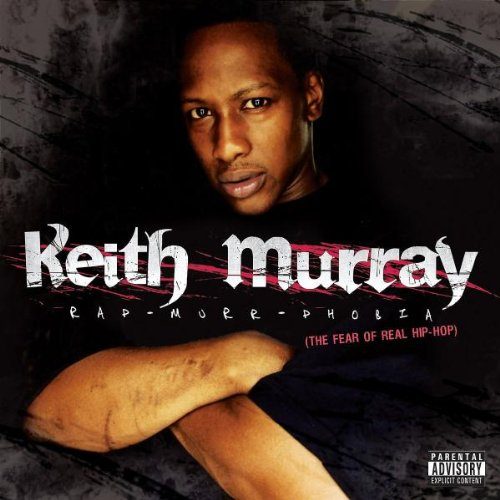In 2007 no rapper needs to start their album with a skit where he rings someone’s doorbell and blows his head off when the door opens. It’s not just that it’s a senseless and gratuitous display of violence – popular culture is filled with plenty of far more graphic examples let alone the six o’clock news. The real problem is three-fold: there’s no creativity to it, it’s an ineffective means of establishing street cred, and it wastes time instead of getting right to the music.
Keith Murray is not a rapper who can afford to waste time. Some of Keith’s best years have already been pissed away between jail time and bad record label deals. In 2007 the clock is ticking on the mainstream name recognition value of Murray. In the underground there’s a core constituency of Murray fans who have been down ever since he dropped “The Most Beautifullest Thing in This World” back in 1994, but the truth is that’s the solo only album in his entire career to go gold. He’s bounced around the Billboard charts a few times since and even managed to sell well in 1998 as one-third of Def Squad, but his career has largely been marked by commercial dissapointment. “Rap-Murr-Phobia” may not be his last chance to make a good impression, but the clock is already at two minutes to midnight. It’s somewhat telling that the first single “Nobody Do it Better” sounds like a direct sequel to his “Most Beautifullest” single, having virtually the same bassline and tempo as the original. It’s even more telling that Tyrese and Junior are billed as co-starring on the song, meaning that Murray is virtually daring radio and MTV not to put him in rotation. The most telling thing of all is that Murray spends almost the entire song reminding the audience of his list of accomplishments:
“Keith Murray, the lyrical Hannibal, flow cannibal
Animalistic tough guy manhandle you
I came into this bitch +Hostile+, hardcore
Then I heard a hater say he ain’t fire no more
What?! That was me standin on your block with the razor blade
in my mouth back when hip-hop was hip-hop
For those who don’t know or forget
To make y’all happy with Mary J. who Puff came to get (me)
Then who called for Total to make y’all see (me)
Then who he called again for +Special Delivery+ (that’d be me)
There’s nuttin you could tell me
I rocked every hole in the wall, then arena to arena with R. Kelly
Who made you feel +Beautiful+ while +Gettin Lifted+ (me)
I rocked bells with L you must be stupid
I don’t need no permission, to do what I do
Come through and show the whole world how I do”
Fortunately for Murray he’s not really bragging – the list of accomplishments he drops may be self-congratulatory but it’s all actual and factual. Even though the song attempts to rehab a style and a flow he dropped 13 years ago, it’s hardly a musical mistake to do so. In fact the song is highly enjoyable and easily the best first single Murray has dropped from an album in a long time. The rest of “Rap-Murr-Phobia,” which is subtitled “The Fear of Real Hip-Hop” is a more mixed bag. Erick Sermon produces all of the album with a couple of minor exceptions, those being the subtle and smooth “Don’t Fuck Wit Em” by Mike City and the reggae inspired banger “Hustle On” by Shuko. This has positives and negatives – Sermon is a long-established veteran of both rapping and producing, so his tracks are clean and his long friendship with Murray allows him to fine tune the beats to his strengths. On the flipside going with Sermon for the entire album is playing it safe at a time in Murray’s career where it wouldn’t hurt to take a few risks. There’s nothing wrong with songs like “Weeble Wobble,” the Def Squad all-in collabo’ “U Ain’t Nobody,” or hard-hitting Wu-Tang duets like “What it Is” with Method Man. The problem is that they’re exactly what you’d expect – not pushing the envelope in any way. If Murray was looking to make an impression, this would be the time in his career to rock a Prince Paul or Mannie Fresh beat, and put guests from Paul Wall to Twista up in the mix.
In 2007 it’s definitely fair to say that the general public has a fear of real hip-hop, because real hip-hop has been presented in a very negative light. Nobody hears about the rappers who donate their time and money to charity, or who give free concerts from Brooklyn to Compton, or who empower the youth in their neighborhoods by funding community centers. The media loves to focus on the negative – this rapper stabbed that rapper and this one got pulled over with weed in his car – he’s going to jail. Unfortunately the opening skit of “Rap-Murr-Phobia” plays to those very fears instead of offering the kind of reassurance one would want, especially considering Murray has already had his share of legal troubles. The whole point of the album should be to prove the critics wrong, both about Murray being past his prime and about hip-hop being played out. The album largely succeeds from a hip-hop point of view but won’t make even a tiny dent on the surface of such criticism, because Murray played it safe and decided to “keep it real” at the expense of showing the public just how creative and innovative he really is.

